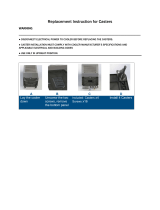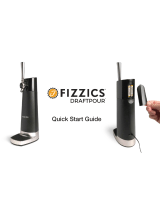
9
VACATION AND MOVING TIPS
• If the unit will not be used for several months, unplug the
power cord, clean and dry the interior thoroughly and
leave the door open slightly, blocking it open if
necessary, to prevent odor and mold growth.
• When moving the unit, disconnect the power cord from
the wall outlet. Thoroughly clean the interior and secure
all loose items by taping them securely in place to
prevent damage. In the moving vehicle, secure the unit in
an upright position to prevent movement. Also, protect
the outside of the unit with a blanket, or similar item.
Remove the coupler from keg by rotating it
counterclockwise.
• Remove the red hose (gas line) from the coupler. Make
sure the canister valve and regulator shut-off valve is shut
off before removing the hose.
• Remove the faucet from the shank assembly by turning the
threaded stainless steel collar clockwise using a faucet
wrench.
• Disassemble the faucet parts and place in the cleaning
solution bucket.
• Attach the brass attachment on the end of the cleaning
hose to the faucet shank assembly by turning the stainless
steel collar counterclockwise. Tighten the collar slightly.
• If the coupler has a shutoff, make sure it is in the open
position.
• Place the keg coupler in the cleaning solution bucket and
pump the cleaning solution through the beer line.
• Clean the faucet parts and keg coupler thoroughly using
the faucet cleaning brush. Also, use the faucet cleaning
brush to clean around the shank and coupling.
• Rinse all the parts with cool fresh water and reassemble
the faucet.
• Detach the cleaning solution bottle from the faucet shank
by turning the threaded stainless steel collar clockwise.
Rinse the bottle with cool fresh water.
• Fill the bottle with fresh water and re-attach it to the faucet
shank assembly. Pump the water through the beverage
line (clear hose). Make sure the end of the line is in a
bucket to collect rinse water.
• Disconnect the cleaner and reinstall the faucet to the
shank by turning the collar counterclockwise using a faucet
wrench and tightening it slightly. DO NOT over tighten the
collar.
• Reattach the red hose (air line) to the keg coupler and
open both the canister valve and regulator shut-off valve.
• Reattach the keg coupler to the keg. Refer to Coupler –
Keg Installation procedures.
• Remove the drip tray and cover from the door and clean
thoroughly. Refer to Cleaning and Maintenance Guide.
• Reinstall the drip tray and cover to the door. Refer to Drip
Tray Assembly Installation procedures.
NOTE: Read and follow the instructions that come with the
cleaning kit before cleaning your beverage cooler.
PROPER CLEANING OF BEVERAGE COOLER
Your beverage cooler’s beverage dispensing system needs
regular cleaning and sterilization in order to continue serving
draft beer with its pure brewery flavor. It is recommended that
the delivery lines be cleaned weekly and the entire delivery
system cleaned before a new keg is attached. This is a
relatively simple task. You will need the following parts to
clean your unit’s dispensing system. These parts are
available at any draft beer dispensing equipment supplier.
One such supplier is Micro Matic. They can be reached at
www.micromatic.com or call them toll free at (866) 291-5756.
(A) 1 quart Plastic Cleaning Bottle
(B) Low Profile Hand Pump
(C) Solid Brass Faucet Cleaning Attachment
(D) 4 oz. Bottle of Cleaning Solution
(E) Faucet Wrench
(F) Faucet Cleaning Brush
• Mix one gallon of warm water with one ounce of the
cleaning solution in a bucket.
• Remove the bottle cap and fill the bottle with the solution.
Replace the cap. Do not discard the remaining solution.
• Before removing the beverage hose from the tap or from
the coupler, make sure the remaining beverage in the
delivery line is blown out. This can be done by quickly
opening and closing the regulator outlet valve.
If leaving the
beverage cooler door open at any
time, make certain that children
cannot get into the beverage cooler
and become entra
ed.
D
OOR REMOVAL
If
door must be removed:
•
Gently lay the beverage cooler on its back, on a rug or
blanket.
•
Remove plastic top hinge cover.
•
Remove screws from top hinge.
•
Remove top hinge from cabinet.
•
•
Remove bottom hinge screws.
Remove door and bottom hinge from cabinet.
•
To replace door, reverse the above order and securely
tighten all screws to prevent hinge slippage.















